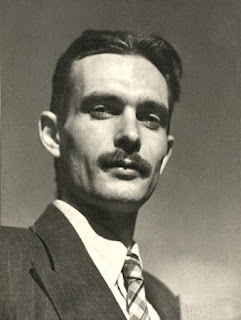 |
| Pettes Memorial Library, Knowlton, Quebec |
Hugely flattered to hear you stole my book. This is fame. I used to steal a lot of books myself, mostly from libraries: my method was to look at the little card in the back envelope and if it hadn’t been taken out more than twice in the past year I would figure I needed it more than the public.
John Glassco, that self-proclaimed "great practitioner of deceit," made a very fine book thief. His personal library, most of which was purchased by Queen's University, includes volumes lifted from the Westmount Public Library and the Royal Edward Laurentian Hospital.— John Glassco, letter to Al Purdy, 18 September 1964
Queen's is not alone in having profited from Glassco's ill-gotten gains. Twenty-three years ago, I purchased what I thought to be his copy of Irving Layton's Balls for a One-Armed Juggler (Toronto: McClelland & Stewart, 1963).
A couple of decades passed before I happened to notice this on the top edge:
Glassco dated the copy April 1963, the month of publication. It is presented here as evidence that he was not above breaking the rule described in his letter to Purdy:
Two summer's ago, I purchased another of Glassco's books, Henry de Montherlant's Perish in Their Pride [Les Célibataires] (New York: Knopf, 1936), only to notice this after the sale:
 |
| (cliquez pour agrandir) |
Now that I’m getting ready to leave I’m casting a selective eye on the books in the library. There’s just so much stuff here I’d like to opt (organizieren) that no one has ever read or will ever read. But I’d better not: that’s bad medicine. Only two: Robert Elie’s La fin des songes (there are three copies, all untouched) and Madame Ellis’ book on Garneau. They’ll none of them be missed, as Gilbert says. Anyway, I’d like to give them a good home.How's that for gratitude?
Trivia: The book Purdy pilfered was The Deficit Made Flesh (Toronto: McClelland & Stewart, 1958). The victim was a Montreal bookseller.
Plug: Both Glassco letters quoted feature in The Heart Accepts It All: Selected Letters of John Glassco, edited by yours truly.
Cross-posted at The Dusty Bookcase.
























